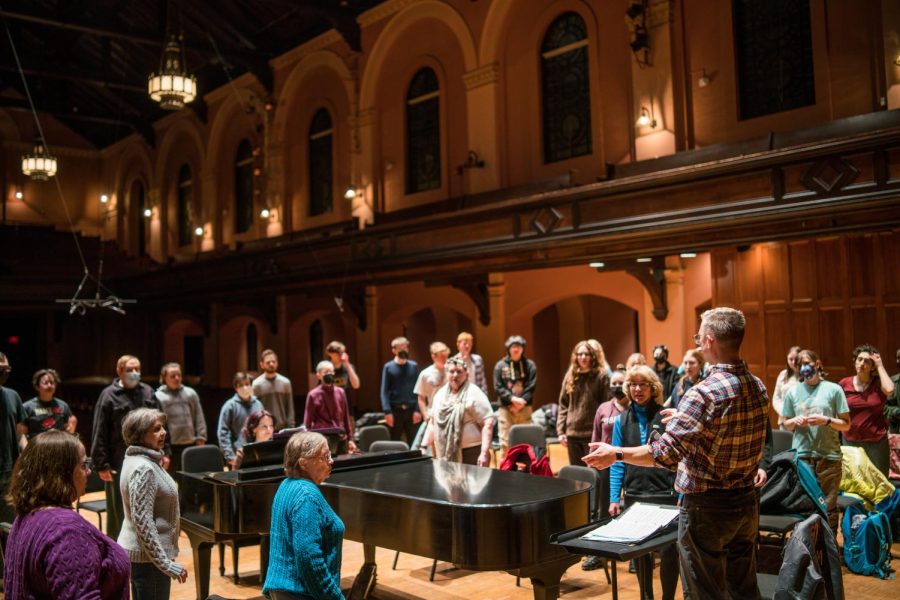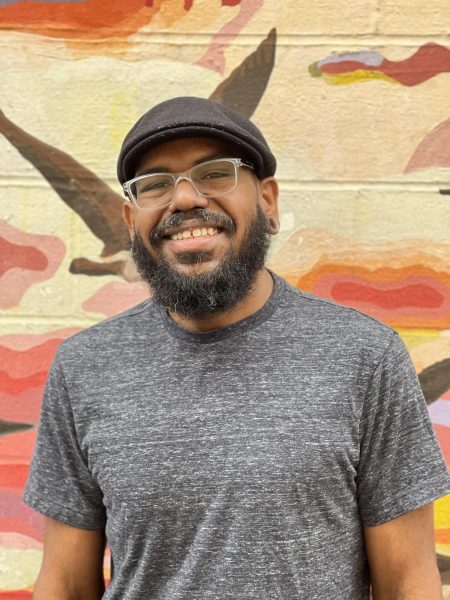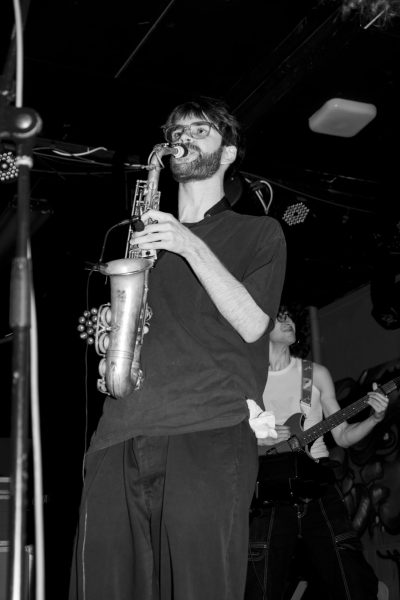Musical Union Fosters College and Community Collaboration
Musical Union rehearses in Finney Chapel.
Founded almost 200 years ago, the Oberlin Musical Union is one of the largest and oldest choirs in the country and continues to uphold and practice choral tradition within the Oberlin community, welcoming anyone with a love of singing to join.
Run by Director of Vocal Ensembles and Associate Professor of Conducting Gregory Ristow, OC ’01, and Visiting Director of Choral Ensembles and Assistant Professor of Conducting Ben Johns, the Oberlin Musical Union prides itself on its inclusion of people of all ages and levels of experience. This ensemble in particular is noteworthy for its membership of College students as well as community members, as it is one of few groups on campus that facilitates this connection.
The varying levels of experience, however, make choosing music for the ensemble challenging. While the choir has tackled repertoire such as Mozart’s Requiem and Orff’s Carmina Burana. Johns, who is responsible for curating pieces, remarked on the unique difficulties this process presents.
“I think it’s the hardest part of my job, honestly,” Johns said. “I spend so much time agonizing over trying to get the perfect program because I’m trying to do a lot of things at the same time. I have to pick stuff that’s going to be challenging for the experienced people but not so challenging that it destroys the confidence of people who aren’t as experienced.”
The choir rehearses every Monday from 7–9 p.m., learning and interpreting music and preparing for upcoming performances. To aid in the rehearsal process, Johns records himself singing each individual vocal part and shares the recordings with the group, facilitating the learning process of everyone involved.
“I’m in the trenches with them,” Johns said. “They know that I’ve also attempted it. I’m not just imposing hard music on them and dropping it off and walking away. I do my best to learn it with them and try out different ways of enunciating the text. Some other community-style groups will plunk it out on a piano, but when we sing, we do so much more work learning how to enunciate the text and learning where to put the word stress. Those are facilities that are really hard to master.”
The efforts of the conductors do not go unnoticed by ensemble members, and the group has had a history of wonderful leaders. One conductor’s pedagogical approach played a role in persuading Alison Ricker, head of the Oberlin Science Library, to keep her job rather than move somewhere else.
“I didn’t intend to stay at Oberlin for more than three or four years: I was headed toward a big research university,” Ricker said. “Dan Moe was the first conductor I sang under and he was the reason why I became a very loyal Musical Union choir member. He was so remarkable and gentle in spirit, really nurturing, and I felt a really strong loyalty to the organization itself.”
Prior to coming to Oberlin, Ricker had experience singing with the Savannah Symphony. The Oberlin Musical Union, however, has proven to be equally rewarding in more ways than one.
“I was pregnant all through the fall semester of 1987 and into the spring semester 1988 — I was huge, really enormous, by the ninth month,” Ricker wrote in an email to the Review. “I had the baby on Friday, March 18, [and] when it was announced that Alison Ricker (the very pregnant alto) had her baby, I was told there was a nice round of applause. So many people congratulated me and asked how things were going. …. That’s an indication of the sense of community and support among the Musical Union.”
The Ensemble was recently invited to perform alongside the College Choir, Gospel Choir, and Conservatory Orchestra at Carnegie Hall in January. In New York, they performed The Ordering of Moses by R. Nathaniel Dett. Presently, the group is preparing for performances set later this spring.
“For a couple of community members it was their first time seeing Carnegie, and they were like, ‘Wow, I don’t think this would’ve happened if I hadn’t been a part of this group.’ And some of them have been a part of this group for decades,” Johns said. “I’d never sung at Carnegie before, and it’s definitely a career highlight now.”




